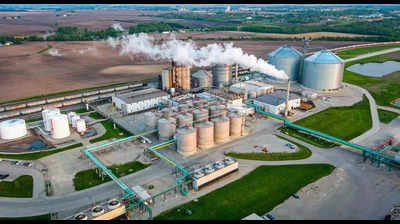
Why ethanol plants?
The Ethanol 20 policy, introduced by the Centre in 2021, aims to blend 20% ethanol into petrol nationwide by 2025-26, advancing the previous 2030 target set under the 2018 biofuel policy. This move seeks to reduce dependency on imported fossil fuels and promote cleaner energy alternatives. To accelerate this shift, the govt changed the approval process for ethanol plants, bypassing public opinion and offering various incentives. Once the Centre grants permission, state govts facilitate additional clearances, including those from Pollution Control Boards (PCB) and water supply departments.
How is ethanol produced?
Ethanol can be produced from various raw materials, including:
•Sugar-based sources: Sugarcane juice, molasses
•Starch-based sources: Corn, rice, sorghum, wheat and broken rice
These materials are rich in starch, which is converted into sugars, then fermented to produce ethanol. The production capacity of these ethanol plants ranges from 60,000 litres to 6,00,000 litres per day
What are the uses of ethanol?
Ethanol, also known as ethyl alcohol, is a versatile liquid used in various industries:
• Fuel: Blended with petrol to reduce fossil fuel use and emissions
• Alcoholic beverages: Essential for producing beer, wine and spirits
• Industrial solvent: Used in making paints, varnishes and inks
Ethanol is a colourless liquid with a characteristic odour, valued for its effectiveness as both a fuel and a solvent
Why these plants face opposition?
Fears of threat to food security
Critics argue that ethanol production requires vast cultivation of food grains such as rice, corn, and sorghum. This expansion could reduce land availability for essential crops such as pulses, oilseeds, and vegetables. Consequently, India might become increasingly reliant on imports to meet domestic demand, driving up costs and jeopardising nutritional food security.
Doubtful environmental benefits
While ethanol-blended fuels aim to cut emissions, critics claim otherwise. Ethanol from sugarcane may emit 40% more carbon than petrol, and ethanol from corn or wheat could double emissions compared to traditional fuels. These concerns challenge the narrative of ethanol as a cleaner alternative.






